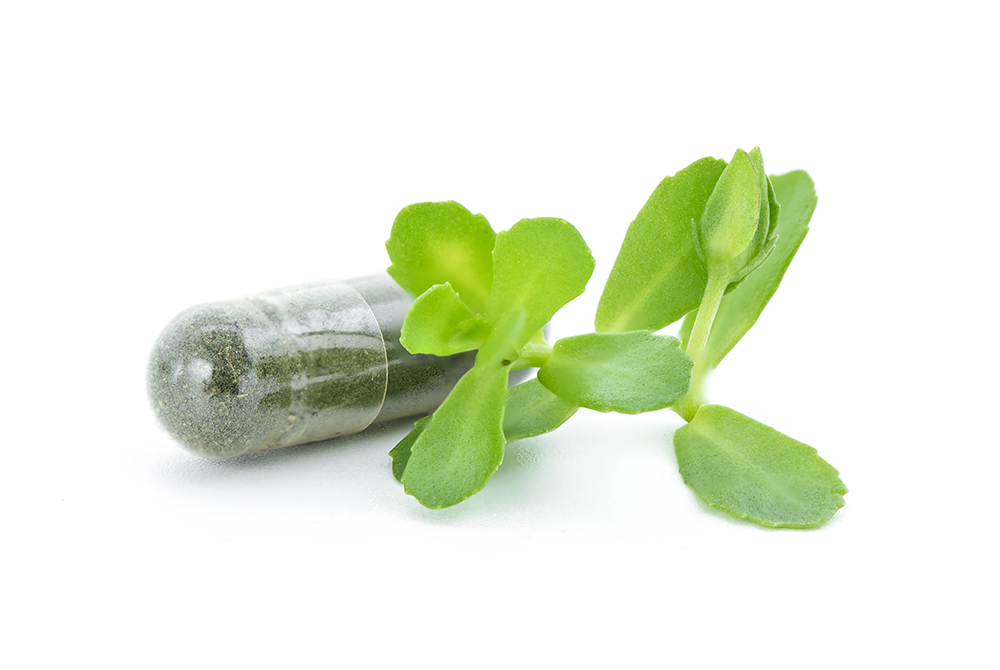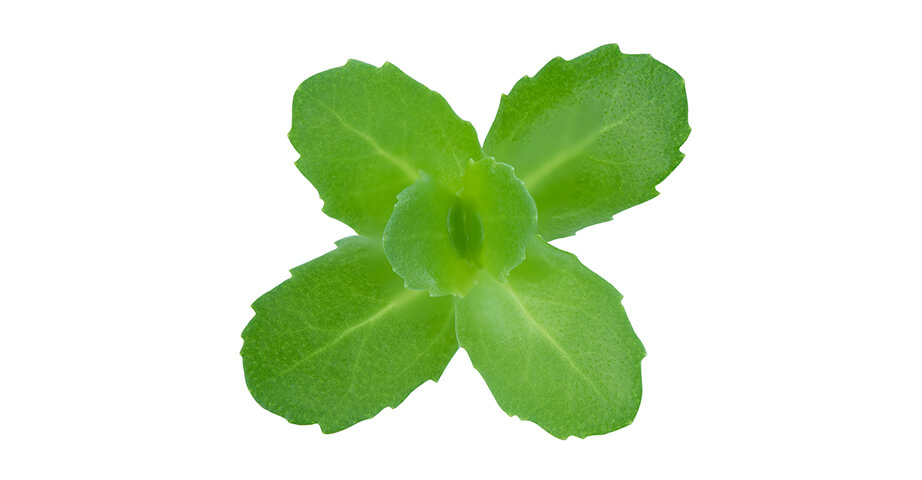Bacopa (Bacopa monnieri) - an Ayurvedic medicine with the potential of supporting the nervous system

Bacopa is a plant that likes a moist environment. It even grows underwater. Therefore, the Western world knows it mainly as an aquarium plant. How about the East? The East considers Bacopa as a valuable medicinal plant. Its traditional uses are confirmed by modern science. Bacopa monnieri can have a very good effect on problems and diseases of the nervous system. How does bacopa work and what can it help?
Where does bacopa come from?
Bacopa grows wild in India, China, Nepal, Vietnam, Sri Lanka and Florida. It can be found at altitudes of more than 1,300 metres above sea level, in wetlands, swamps and shallow water. Bacopa grows well completely underwater, which is why aquarists like it and use it as an ornamental plant in aquariums. Bacopa is a small climbing herb with numerous creeping stems, reaching lengths of up to 30 cm. Bacopa is a plant known by many names. Bacopa is called " water hyssop", "gratiola", or "herb of grace". One of its most popular names is "brahmi", which is derived from the name of one of the Hindus gods, Brahma
Bacopa is a plant used in Ayurveda - traditional Indian medicine. Ayurveda considers bacopa as an agent balancing pitta imbalance. According to Ayurveda, pitta energy is believed to be the regulator of heat, energy, excitement and passion. It is thought that pitta imbalance is expressed in inflammation, overheating, over-stimulation of the mind or body.
What does modern science say about the effects of bacopa on the human body? It turns out that bacopa has the greatest effect on the nervous system. Therefore, this matches the traditional understanding of the importance of bacopa for health.
Bacopa monnieri - chemical composition and effects
The active constituents of Bacopa monnieri which are most responsible for the plant's properties are steroidal saponins - bacosides. Their presence is the factor causing the standardization of Bacopa monnieri preparations.
The other compounds present in Bacopa monnieri are:
- alkaloids herpestin and brahmin with strychnine-like effects (responsible for the need of limited intake of Bacopa monnieri),
- the flavonoids luteolin and apigenin with strong antioxidant and anti-inflammatory properties,
- betulinic acid, which can induce apoptosis of cells in many human cancer cell lines,
- the phytosterols stigmasterol, β-sitosterol, stigmastanol with beneficial effects on the cardiovascular system.
The potential supportive effects of Bacopa monnieri are based on its antioxidant, anti-inflammatory and nitric oxide (NO) increasing properties. Bacosides from Bacopa monnieri neutralise free radicals and prevent fat molecules from reacting with free radicals. When fat molecules react with free radicals, they undergo a process called lipid peroxidation. Lipid peroxidation has been linked to several conditions such as Alzheimer, Parkinson and other neurodegenerative disorders. It is believed that Bacopa monnieri may help prevent the damage caused by this process. According to laboratory studies, Bacopa monnieri inhibits the release of pro-inflammatory cytokines, which are molecules that stimulate the inflammatory immune response, and the enzymes: cyclooxygenase, caspase and lipoxygenase, which play a key role in inflammation and pain perception. Bacopa monnieri may exhibit anti-inflammatory effects similar to the power of diclofenac and indomethacin - non-steroidal anti-inflammatory drugs commonly used to treat inflammation.
Recommended products with Bacopa
Bacopa - effects on the nervous system
Bacopa can have anti-stress and anti-anxiety effects by influencing numerous processes in the nervous system, including modulation of Hsp70 gene expression and levels of cytochrome P450. Due to the improvement of the body's response to stress, small-leaved bacopa is classified as an adaptogen.
By affecting the hippocampus, lengthening dendrites and increasing the number of connections they form, as well as stimulating conduction in nervous tissue, bacopa may improve memory. According to clinical studies, long-term supplementation with small-leaved bacopa for more than 12 weeks may have a positive effect on cognition, focus and memory in healthy, middle-aged people. The effect remains for about 4 weeks after ceasing supplementation. Another benefit of bacopa is a possible increase in blood flow in the brain. Improved blood supply and oxygenation of the brain is contributing factor to cognitive functioning. Bacopa may also exhibit antidepressant effects, but in this aspect mainly animal studies are available so far.
The intake of small-leaved bacopa may be helpful for ADHD, but primarily with long-term use of at least 6 months. In people with ADHD, small-leaved bacopa may alleviate symptoms such as anxiety, poor self-control, inattention and impulsivity. In contrast, concentration levels may increase.
How else can brahmi affect our health?
There are ongoing studies, also involving humans, which show that:
- brahmi can regulate blood pressure by influencing the release of nitric oxide (NO).
- bacopa can be used as an analgesic for chronic pain. One study compares the effectiveness of brahmi to that of morphine
- brahmi may be helpful in preventing epilepsy attacks.

How to take Bacopa monnieri preparations?
Bacopa monnieri can be purchased as >dietary supplements in capsules or powder. Good preparation should contain bacopa monnieri extract, not powdered parts of the plant, and be standardised for the content of bacosides.
The most commonly recommended form of consuming bacopa powder is to add a serving to hot water and drink it as a herbal tea. Capsules should be taken according to the manufacturer's recommendations.
Doses of Bacopa monnieri extract that have been shown to be effective in human studies are typically 300-450 mg per day. At these doses, bacopa appears to be safe and is unlikely to cause any side effects. Due to the lack of available research, taking bacopa is not recommended for pregnant or breastfeeding women.
